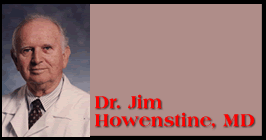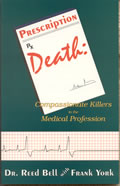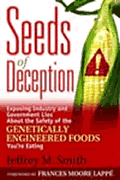Other
Howenstine Articles:
Use of CoQ10
to Treat Malignancies
Why You Should Avoid Taking Vaccines
WHY DO MEN GET SWELLING AND CANCER OF THE PROSTATE GLAND?
By Dr. James
Howenstine, MD.
April 9, 2004
NewsWithViews.com
What Causes Benign Prostatic Hypertophy BPH?
This is invariably a disease of men over the age of 50. The symptoms produced by an enlarging prostate gland are occasionally surprisingly few, even in very large glands. Usually there is some decrease in the force of the urinary stream, difficulty initiating urination, and incomplete bladder emptying. The man who is not emptying his bladder completely will urinate and then be able to urinate a considerable amount of urine again in 15 or 20 minutes. In the later stages, urine dribbles out instead of flowing and finally straining to empty the bladder fails to accomplish the passage of any urine (urinary retention which requires catheter drainage of the bladder).
The current concept accepted by many physicians is that testosterone is related to prostate gland enlargement (BPH). However, young males with soaring levels of testosterone never develop prostate enlargement and elderly males with very low levels of testosterone do get BPH.
An enzyme 5-alpha-reductase converts testosterone to dihydro-testosterone, which is far more active than testosterone in binding to sites in prostate cells that stimulate cell growth. The herb saw palmetto and the drug Proscar both inhibit 5-alpha-reductase. A 1998 review of 18 clinical trials using saw palmetto found that 75 % of men with BPH who took saw palmetto for two months reported an improvement in their urinary symptoms. Saw palmetto is found in health food stores.
A research study of 207 males with BPH who were given daily doses of testosterone revealed that these patients developed shrinkage of the prostate gland, decreased symptoms of bladder obstruction and falls in PSA and estradiol levels. This suggests properly administered testosterone is good for the prostate gland. British physician, Dr. Malcolm Carruthers, came to the same conclusion after treating more than 1000 men lacking testosterone both by testosterone implants and injections as reported in his 1996 book Maximizing Manhood. He noted neither enlargement of the prostate or prostate cancer in these males treated with testosterone.
All males in developed nations are victims of estrogen excess caused by petrochemical exposure, estrogenic hormones given to promote growth of animals, plastics, pesticides, and herbicides, all of which have estrogenic effects in males and females. In males the enzyme aromatase converts testosterone to estrogen. Males getting testosterone by injection may occasionally develop increased estrogen levels because of this enzyme aromatase, whereas males taking testosterone by implants and creams are less likely to develop this problem. Enlargement of the prostate gland in elderly males is probably caused by estrogen excess. Estrogen accumulates in the prostate gland of elderly males beginning at age 50. This estrogen is associated with the degree of prostate enlargement. The risk of benign prostaic hypertrophy is increased in males with high estradiol (potent estrogen) levels and is accentuated in males with low androgen (testosterone) levels. This suggests that measures directed toward ameliorating the estrogen excess might be effective therapy (DIM, progesterone, testosterone).
Elderly men have trouble metabolizing estrogen particularly if they are obese or using alcohol regularly. Breast enlargement in these men is evidence of estrogen excess.
Cruciferous vegetables (broccoli, cabbage, cauliflower, brussels sprouts, bok choy) contain diindolylmetnane DIM which helps reverse estrogen related disorders. Three of more servings weekly of cruciferous vegetables can reduce the risk of prostate cancer by nearly 50 percent. DIM has decreased nocturnal urination in symptomatic elderly males
Correctly administered testosterone therapy does not cause prostate cancer. However, a male who has an undiagnosed prostate cancer may have that cancer grow at an accelerated rate under the influence of testosterone. For this reason males with prostate cancer should not be given testosterone and males with elevated PSA values need to be monitored closely with rectal exams and PSA tests if a decision is made to try them on testosterone therapy. To find a physician experienced in administering hormonal therapy call the American Academy of Anti-Aging Medicine at 719-475-8775 or visit www.worldhealth.net.
About ten percent of men will need to have an enlarged prostate gland cored out (TUR) or removed surgically by the time they reach 80.
Which Substances Can Relieve The Symptoms Of An Enlarging Prostate Gland?
Individuals with an enlarging prostate gland are often troubled by frequent urination, weak urine stream, difficulty initiating urine flow, nocturnal urination, and discomfort while voiding. All of the following therapies seem to be helpful in relieving these symptoms:
-
Testosterone. Topical patches or injections of testosterone are capable of reversing the enlargement of the prostate gland. Growth hormone and DHEA dihydroepiandosterone arecapable of increasing the output of testosterone. Do not take more than one of these three therapies at any given time.
-
Pygeum. This extract of pygeum africanum is effective in decreasing urinary symptoms. The tree source for this extract is becoming scarce due to widespread use of pygeum in Europe where it is often considered to be a medicine.
-
The herbal extract Urtica dioca (nettle) works well in conjunction with saw palmetto to improve results. Nettle seems to work by preventing the binding of testosterone metabolites to prostate cell membranes. It also inhibits the binding of growth-stimulating estrogen to prostate cells.
-
Phytosterols are chemicals found in plants, oils, seeds, and legumes. A potent phytosterol called beta-sitosterol acts to significantly reduce levels of 5-alpha reductase and aromatase in animal experiments.
-
Chrysin is a bioflavinoid extracted from the plant Passiflora correlus. This nutrient reduces the action of aromatase in converting testosterone to estrogen. Preserving the testosterone increases the anti-aging effects of testosterone in males.
-
Progesterone. Topical natural progesterone is converted in males into testosterone without any feminizing side effects.
-
Pumpkin seed oil. This oil, contains essential fatty acids, amino acids and vitamins. Research in Stockholm reported improved urine flow, decreased retained urine and less frequent urinating in 53 patients taking pumpkin seed oil and substances from a dwarf palm plant.
-
Amino Acid Therapy. The combination of the essential amino-acids L-glutamic acid, L-alanine, and glycine produced less nocturnal urinating, decreased frequency of voiding, and less urgency to urinate in 45 males with BPH.
-
Zinc The prostate gland uses 10 times more zinc than any other organ. Zinc decreases the conversion of testosterone to DHT.
The above ingredients are found in many combinations in a wide variety of products to treat benign prostatic hypertrophy. There will never be any studies comparing one of the available prostate products with another, as funding for such studies is unlikely to occur. My suggestion is that you study the existing products and try one for 2 to 3 months looking for a decrease in symptoms. If you notice no change try a new therapy.
What Factors Contribute To The Development Of Prostate Cancer?
Lycopene
47,894 health care workers were carefully followed during a four- year study. None had prostate cancer at the beginning of the study but 773 had developed prostate cancer by the finish. Men who ate 10 servings a week of tomatoes or tomato sauce on pizzas had 45 percent less cancer of the prostate than those eating no tomatoes. Surprisingly, tomatoes on pizza seemed more beneficial than raw tomato, suggesting that heating the tomato paste increases the anticancer effect. This study confirms previous studies of Mediterranean people, which showed that they had one of the lowest rates of prostate cancer. Afro-Americans eat few tomatoes and they had the highest rate of prostate cancer.
Watermelon contains even more of the phytonutrient lycopene than do tomatoes. A patient with an androgen-resistant (not responding to anti-testosterone therapies) prostate cancer at Wake Forest School of Medicine was treated with only 10 mg. daily of lycopene and 300 mg. of saw palmetto 3 times daily. In 2 months his bone metastases were improved and his PSA had fallen from 365 to 8.1 ng/ml. Saw palmetto does not lower PSA. This small amount of lycopene could be obtained from daily consumption of 1½ cups of watermelon or 3 tablespoons of tomato sauce.
Health Hazards From the Use of Recombinant Growth Hormone in Cows to Increase Milk Production
A genetically engineered growth hormone (rBGH or rBST) has been used to increase milk production from cows in the United States since February 1995. The milk obtained from cows getting injections of this growth hormone is not labeled. This injected growth hormone increases the insulin-like growth factor (IGF-1) in milk by 80 percent. The IGF-1 is absorbed from milk and is identical to the IGF-1 normally found in humans. Casein from milk and homogenization of milk keep the IGF-1 from being broken down in the stomach so it is readily absorbed into the blood. IGF-1 functions in the human body to accelerate cancer growth. Research has shown a direct correlation between high levels of IGF-1 and rapid growth of malignant cells in the pancreas, lining of the uterus (endometrium), brain, thyroid, muscle, and osteosarcoma of bone.
There is a four-fold greater risk for developing prostate cancer in males who have a high level of IGF-1 when compared to males with normal IGF-1 levels. Another prospective study revealed that pre-menopausal women less than 51 years old with the highest levels of IGF-1 in their blood had a seven-fold greater risk of developing breast cancer. This information suggests that measuring IGF-1 levels in patients at risk for endocrine gland tumors could be valuable. Those with high IGF-1 levels might be wise to curtail their intake of milk products. At this time approximately 40 % of the American diet is made up of milk products (milk, cheese, cream, butter, ice cream, yogurt).
Atrazine
Dr. Sherry Rogers has warned that “atrazine (herbicide) has caused prostate gland enlargement, low testosterone levels and depression by interfering with serotonin synthesis”. She is convinced that the massive use of herbicides has contributed to the rising incidence of prostate cancer seen in the past 20 years. An atrazine manufacturing plant in Louisiana has an incidence of prostate cancer in male employees 9 times that of the general public. This damaging information about increased risk of prostate cancer for employees was withheld for 11 years from the EPA by the manufacturer Syngenta.
Cruciferous Vegetables
Cruciferous vegetables (broccoli, cabbage, cauliflower, brussel sprouts, bok choy) contain diindolylmetnane DIM which helps reverse estrogen related disorders. Three of more servings weekly of cruciferous vegetables can reduce the risk of prostate cancer by nearly 50 percent. DIM has decreased nocturnal urination in symptomatic elderly males.
Undiagnosed Prostate Cancer
Correctly administered testosterone therapy does not cause prostate cancer. However, a male who has an undiagnosed prostate cancer may have that cancer grow at an accelerated rate under the influence of testosterone. For this reason males with prostate cancer should not be given testosterone and males with elevated PSA values need to be monitored closely with rectal exams and PSA tests if a decision is made to try them on testosterone therapy.
Measures To Prevent Prostate Cancer
All males should be careful that your supplementation program includes 200 mcg. of selenium daily as selenium has been shown to decrease the incidence of prostate cancer by 67 percent. Minimizing exposure to milk, herbicides, pesticides, vehicle exhaust fumes, estrogens in meat and chickens (eat organic food), plastics, propylene glycol, sodium laurel sulfate and petrochemicals is advisable as excess estrogen clearly is a risk factor for endocrine malignancies including cancer of the prostate gland. Obtaining lycopene from food and as a supplement is also a sensible precaution.
Estrogen exposure in
conjunction with
dwindling amounts of testosterone seems to be the primary cause for an
enlarging prostate gland in elderly males. Efforts to minimize contact
with estrogenic substances (xenoestrogens) along with therapy aimed at
boosting the beneficial effects of testosterone (chyrisine, natural
progesterone, intramuscular or patches of testosterone, growth hormone,
DHEA, cruciferous vegetables) should permit reversal of the large
prostate gland. To find a physician experienced in administering
hormonal therapy contact the American Academy of Anti-Aging Medicine at
719-475-8775 or visit www.worldhealth.net
© 2004 Dr. James Howenstine - All Rights Reserved
Dr.
James A. Howenstine is a board certified specialist in internal
medicine who spent 34 years caring for office and hospital patients.
After 4 years of personal study he became convinced that natural
products are safer, more effective, and less expensive than
pharmaceutical drugs. This research led to the publication of his book
A Physicians Guide To Natural Health Products That Work. Information
about these products and his book can be obtained from amazon.com and
at www.naturalhealthteam.com
and phone 1-800-416-2806 U.S. Dr. Howenstine can be reached at jimhow@racsa.co.cr
and by mail at Dr. James Howenstine, C/O Remarsa USA SB 37, P.O. Box
25292, Miami, Fl. 33102-5292.
"The current concept accepted by many physicians is that testosterone is related to prostate gland enlargement (BPH). However, young males with soaring levels of testosterone never develop prostate enlargement and elderly males with very low levels of testosterone do get BPH"






